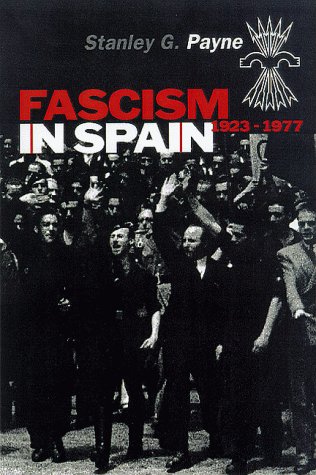

 |

|

The average rating for Fascism in Spain, 1923-1977 based on 2 reviews is 4 stars.
Review # 1 was written on 2011-12-23 00:00:00 Walt Walt Walt WaltStaney G. Payne is one of the founders of fascist studies, and this was his last reexamination of the Falange and its leadership from its birth in the twenties until the final death of the movement with Franco. Payne utilizes his own research, but also integrates many secondary studies, mostly written in Spanish, to provide a synthetic work in English that corrects old errors and outlines a solid and believable history superior to anything else up to that point. The work is chronological, with chapters dedicated to significant periods and broken into thematic sections to demonstrate the development of different aspects of the movement. Attention is given to significant individuals (Jose Antonio Prima de River, Ledesma, Hedilla, Serrano Suner and others) and ideological concepts (Patria, national syndicalism, the position of the party vis-a-vis the church, etc). The final analysis discovers that fascism was actually comparatively weak in Spain, as against other European nations at the time, with no mass support and limited electoral appeal even at its high point, and only became significant due to participation in the Spanish Civil War and the support of the true fascist nations (Italy and Germany) in winning that war. Franco, while he was sympathetic to the Axis and was certainly a right-wing authoritarian dictator, never cared much for fascist ideology, and only used the Falange as a prop for his own power, never giving it the opportunity to experiment with fascist solutions to Spanish political problems. Once the Second World War had ended, Franco quickly de-fascistized the regime, only occasionally giving crusts of encouragement to the movement leaders he saw as loyal and quickly stifling any resurgent fascist opposition. For scholars familiar with the study of fascism, none of these conclusions should be new or surprising, although a lay audience might find them so. The association of Franco with fascism kept Spain out of NATO for years and has influenced the Left and its understanding of Spanish history. In setting Franquismo apart from Falangism, Payne is following a standard scholarly concensus (one which he himself helped to form in the 1960s), but those new to the field may have difficulty understanding the difference from this text. He does not spend much time providing a theoretical analysis or introducing the reader to debates over the “fascist minimum.” He mentions “palingenesis” at one point, but gives no introduction to Roger Griffin and his approach to the definition of fascism – you have to be “in on it” to get it. I had a few criticisms of certain citations, in particular points where he cited his own interviews with Movement veterans in the 1950s, no doubt part of the work he did on his dissertation. While these interviews make interesting evidence, they can hardly be seen as conclusive and I think should have been more clearly noted in the text, with statements like “according to his own recollection,” or “as an aging veteran remembered many years later.” These points are relatively minor, however, and for those with some background and understanding of the context, this is a delightful and fascinating text. |
Review # 2 was written on 2015-07-02 00:00:00 Nelson Morphew Nelson MorphewLook, I'm not going to finish this thing by reading it from cover to cover. So I might as well put it in the 'Read' category and return it to the shelf. Fact is, it's a reference book. You want to know about the origins of Falangist Spain, the Civil War, etc., it's all here. You need details, this one's got them. It also has quite a few photos to help you put faces to names. It's very useful for figuring out the aristocratic roots of the Spanish variety of fascism as opposed to its German counterpart. Jose Antonio Primo de Rivera comes across as a true believer, only minimally cynical. I'll go ahead and give it 4 stars. What the hell. |
CAN'T FIND WHAT YOU'RE LOOKING FOR? CLICK HERE!!!